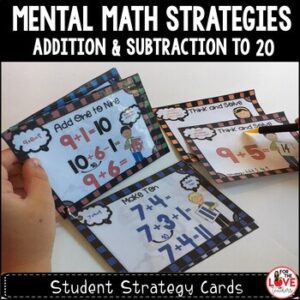Being a teacher of gifted learners, I’ve had my share of teaching the perfectionist student. However, perfectionists are found in all classrooms. Perfectionism from k-12 is a concern in schools as more and more students feel pressured by academics and their peers, and it doesn’t stop there. Perfectionist students go on to be perfectionist adults in the workplace. Know any? I bet you are thinking of one right now. In fact, I’m thinking about myself and how I struggled with how being a perfectionist put me on the path to burnout. I wrote about how to change the mindset of the perfectionist teacher to work smarter, not harder.
Teaching perfectionist students and supporting perfectionist students are two different things and it could be really challenging. Fortunately for me, while I was struggling to understand and to help these students, I was taking a course for my gifted and talented instructional certificate. It was in that course that I had the opportunity to delve deep into a topic that was like the white elephant in the classroom. I wanted to confront that elephant, I wanted to understand that elephant and I wanted to help that elephant. So I got knee-deep with understanding perfectionism and learned ways to support perfectionist students.
Understanding Perfectionism
Perfectionism is the setting of high standards or expectations for one’s self that may be unrealistic to achieve. Perfectionists feel that what they accomplish is never quite good enough. Perfectionists will give more than 100% on everything they do and will strive for perfection, not just excellence in school. They will make every effort for the highest grade and will put extreme pressure on themselves until they are satisfied with the results In many cases, perfectionists are never satisfied and become underachievers and have low self-esteem.
Characteristics of the Healthy/Normal Perfectionists
• Wants to do their best
• Strives for excellence
• Enjoys challenges and is satisfied with their success
• Learns from their mistakes
• Does not become stressed out or depressed from their efforts
Characteristics of Unhealthy/Neurotic Perfectionists
• Sets unrealistic goals that may never be achieved
• Works hard to please themselves, teachers, parents, and peers
• Has a misconception that they need to perfect because that is what is expected of them
• Often experiences a feeling of worry and anxiety which leads to social and emotional problems
• Has a fear of failure, fear of making mistakes or fear of disapproval from parents, teachers or peers
• Feels pressured from others
Identifying a Perfectionist Student
If you think you may have a perfectionist student in your class, look out for these characteristics. Students who:
• set unrealistic high-performance standards
• set goals that may be impossible to achieve
• strive for perfection because they fear failure
• tend to crave success and will not be satisfied until they are successful
• measure their self-worth in term of their accomplishments and success
• have an “all or nothing” thinking, which they feel that they are worthless if they are not perfect
• have difficulty in taking credit or pride in their work because they expect to achieve success
• procrastinate in getting started on their assignments and may delay in completing assignments because the work must be perfect from the beginning to the end
Not to mention that perfectionism affects social-emotional learning on the mind, body, and relationships. Sound familiar? Have any of these students in your class? At the beginning of the year, I give this survey, How Much of a Perfectionist Are You? to my students to find out a little bit more about them. I read it aloud to the younger students and break it down or modify it if needed. This survey is strictly confidential and I use it only to better know my students. Knowing my students helps me better plan my instruction, group my students and meet their needs.
Survey Results – 3rd Grade- 21 Gifted Learners:
• 1 Perfectionist- Too Good For Your Own Good
• 2 Borderline Perfectionists
• 5 Healthy Pursuers of Excellence
• 9 Students Hanging Loose
• 1 Student A Little Too Relaxed
• 3 Students Barely Breathing
‘Not too bad,’ I thought. But now what do I do with the results. I wanted all students, perfectionists or not, to feel supported and to be successful.
Here are some action steps to take when identifying perfectionist students in your classroom:
• Reach out to the school guidance counselor and/or school psychologist, and look into intervention and prevention programs in your school or community.
• Provide a supportive and nurturing environment that is safe for students to take risks and make mistakes.
• Reassure students that students are not expected to be perfect; the goal is for them to improve and learn from their mistakes.
• Promote student growth, not perfection!
• Make your expectations clear when giving an assignment. If teachers describe exactly what is expected in terms of concepts, format, and length, this may help with the perfectionist to set realistic expectations for themselves.
• Help perfectionists set realistic goals for themselves. Sharing and comparing student work showing student progress and success can be helpful.
• Help students practice being good to themselves and reward themselves for their hard work and effort. Students can reward themselves by celebrating with family and friends or just doing something fun or relaxing.
• Teach students to accept praise from others and praise themselves. Students need to appreciate themselves and their success because they deserve it.
Our Class Motto:

And now for the adults (I didn’t forget about you!) Are you a perfectionist? Take the survey to find out! I took the survey and I am a Healthy Pursuer of Excellence. 🙂
To read more about helping perfectionist students, read Five Ways to Help the Perfectionistic Student or How To Help a Perfectionist Student.
Have you taught perfectionists? How did you support them? Share your comments below.
Related posts:
Cultivating Mindfulness: Teaching Children To Learn From Failure
Changing The Mindset of The Perfectionist Teacher
Be sure to join the forums to collaborate with other AMAZING teachers! Follow me to be notified when new resources are uploaded to the Shop and join the email list to receive the latest and greatest updates, posts, and monthly freebies!
If you like it, then pin it:



Christine Weis is a passionate educator, classroom management coach, wife, and mom of two busy boys. She enjoys teaching, writing, and creating resources for teachers.










This is a very interesting article. I’ve never read any article that focuses on perfectionist kids. I think they may get looked over in school since they’re at least on-task and working; a lot of energy goes to the “needy” or “struggling” kids. This article definitely helps me to reshape how I view and interact with perfectionist kids. The practical recommendations are great. I’d add that parents need to be in the equation also. I think some of the perfectionist behaviors come from their expectations of their kids. I realize they only want the best for them.
I agree! I haven’t read much about perfectionist students either. I know I can be a perfectionist at times and have seen it in the classroom, especially with gifted learners. I bet they do get overlooked. I like your add…I’ve seen parents pressure their kids to no end. They’d do the same to me as well. That’s a challenge we teachers often overlook. Thank you for reading and for your thoughtful comment.
Christine at For The Love of Teachers
Wow! I wish I read this article earlier in the year. I have a student that definitely meets the criteria listed above. It has been a struggle all year to help them cope when they become frustrated or when it takes them too long to finish an assignment because they are truly trying to exceed expectations, or how eraser marks are just cause to start over. I totally agree with your philosophy: “Mistakes = Success. The best part of making mistakes is having a another chance at fixing them.”—I have used similar words all year when working with this child. “A good writer never finishes in one day”, “Making mistakes makes us stronger because we learn from them”, etc. Patience and nurturing self acceptance is key when working with these students. They are smart, they are talented, and need us to appreciate their efforts. <3
I completely agree with you! These students need a lot of reassurance, nurture and patience. We all have these kinds of students in our class and need to find that balance in supporting them but letting them work it out on their own too. Thanks again for your thoughtful comment as you reflect upon the students in your class.
Christine at For The Love of Teachers
This is great advice on a topic that, as a newer teacher, I honestly hadn’t thought much about. Thank you so much for sharing!
Shana,
Thanks so much for your comment. I am so glad that this advice is useful to you. That makes me happy! 🙂
~Christine at For The Love of Teachers